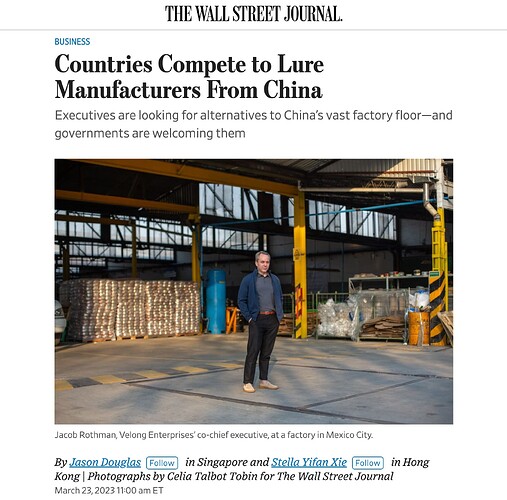-
中国在大流行期间巩固了其在全球制造业的主导地位,联合国的一份报告显示,2021年中国在全球制造业的份额为31%。中低收入国家,如印度、墨西哥、越南、柬埔寨和菲律宾,正在竞相说服企业,他们的国家是中国这台运转良好的制造机器的下一个目标。
-
一个由中国企业高管组成的代表团最近在墨西哥受到了隆重的欢迎,他们与外交和财政部长、大使和省级政府首脑进行了会晤。公司正在寻求减少对中国的依赖,并建立更多样化、更有弹性的供应链。
-
地缘政治的转变使公司因中美之间的贸易和国家安全争吵而受到震动,并因大流行病和乌克兰入侵而中断了供应链。各国政府正全力以赴欢迎这些公司,提供补贴、税收减免和其他优惠以吸引它们,希望为经济发展提供动力,创造数百万个新的就业机会。
-
2022年进入中国的外国直接投资同比下降43%,至1900亿美元。2022年,中国在美国商品进口中的份额从2017年的22%的高点下降到17%。苹果公司已将部分智能手机生产转移到印度,并考虑在越南生产手表和耳机。玩具制造商美泰公司将其在墨西哥蒙特雷的工厂扩建为其全球最大的生产基地。中国电子和电器制造商海信公司正在墨西哥开发一个工业园区,为美国市场生产电器。
-
高管们说,将全球供应链从中国重新定位不会是一个简单的过程。各国不仅在成本和地理上进行竞争,而且还在竞争谁能为公司提供最优惠的待遇,同时满足自己的发展目标。柬埔寨在2021年修改了法律,以吸引外国投资,其好处包括收入税豁免和资本支出的税收减免。越南为高科技产业提供免税期和优惠的公司税率。
-
Dezan Shira & Associates公司关于东南亚投资状况的报告为整个亚洲的企业提供法律、会计和其他服务。报告强调,在柬埔寨,对先进技术、机械和零配件以及电子产品的投资可以享受优惠。越南为愿意在贫困地区投资的公司提供免税期,2.5亿美元以上的大型制造业投资可以享受优惠的公司税率。
-
印度一直专注于低企业税率和政府补贴以吸引海外企业。2021年,印度宣布了近10亿美元的激励措施,以增加计算机和平板电脑的生产。他们还希望在总理的家乡古吉拉特邦发展半导体制造业。
-
墨西哥有靠近美国消费者和USMCA贸易协定的优势。Immex和Prosec计划允许外资企业在墨西哥建立生产设施,并降低进口关税。
-
Velong企业在中国大陆有六家工厂,在柬埔寨有一家,在越南和印度有合资企业。他们正在就在墨西哥建立新的合资企业的条款进行最后的谈判,以便为美国的大型零售商生产炊具。墨西哥的制造业被视为一个历史性的机会,类似于20年前的中国。
-
China has cemented its dominance of global manufacturing during the pandemic, with a UN report showing a 31% share of global manufacturing in 2021. Low and middle-income countries, such as India, Mexico, Vietnam, Cambodia, and the Philippines, are competing to convince businesses that their country is the next best thing to China’s well-oiled manufacturing machine.
-
A delegation of China-based business executives recently received a lavish welcome in Mexico, with meetings with foreign and finance ministers, ambassadors and provincial heads of government. Companies are looking to reduce their dependence on China and create more diverse, resilient supply chains.
-
Geopolitical shifts have caused companies to be shaken by trade and national security spats between the US and China, and disrupted supply chains due to the pandemic and Ukraine invasion. Governments are pulling out the stops to welcome these companies, offering subsidies, tax breaks and other perks to attract them, in the hope of turbocharging economic development and creating millions of new jobs.
-
Foreign direct investment into China in 2022 fell 43% on the year to $190 billion. China’s share of U.S. goods imports fell to 17% in 2022, from a high of 22% in 2017. Apple Inc. has shifted some smartphone production to India and is considering Vietnam for watches and earphones. Toy maker Mattel Inc. expanded its plant in Monterrey, Mexico, into its largest manufacturing facility worldwide. Chinese electronics and appliance manufacturer Hisense Co. is developing an industrial park in Mexico to make appliances for the U.S. market.
-
Rerouting global supply chains away from China won’t be an easy process, executives say. Countries are competing not just on cost and geography, but on who can offer companies the choicest perks while meeting their own development goals. Cambodia revamped its laws in 2021 to attract foreign investment, with benefits including income-tax exemptions and tax deductions for capital spending. Vietnam offers tax holidays and preferential corporate tax rates for high-tech industries.
-
The report on the investment landscape in southeast Asia by Dezan Shira & Associates provides legal, accounting and other services to businesses across Asia. It highlights that investments in advanced technology, machinery and spare parts, and electronics are eligible for benefits in Cambodia. Vietnam offers tax holidays to companies willing to invest in poorer areas and big manufacturing investments of $250 million or more are eligible for preferential corporate tax rates.
-
India has focused on low corporate tax rates and government subsidies to attract overseas businesses. In 2021, India announced close to $1 billion in incentives to increase computer and tablet production. They are also looking to develop semiconductor manufacturing in the Prime Minister’s home state of Gujarat.
-
Mexico has the advantage of proximity to American consumers and the USMCA trade agreement. The Immex and Prosec programs allow foreign-owned companies to set up production facilities in Mexico with reduced tariffs on imports.
-
Velong Enterprises has six factories in mainland China, one in Cambodia, and joint ventures in Vietnam and India. They are in the final stages of negotiating terms for a new joint venture in Mexico to make cookware for big retailers in the U.S. A conference in China for manufacturers interested in setting up in Mexico is due in April. Mexico’s manufacturing sector is seen as a historic opportunity, similar to China 20 years ago.
1 Like
